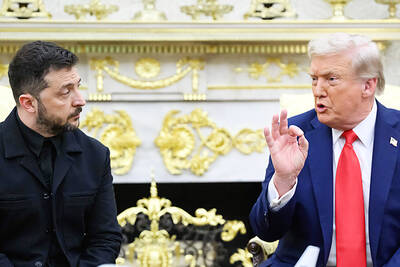The EU and the US are considering personal sanctions against more than 40 officials and state journalists in Belarus for their roles in the rigging of a recent election and crackdowns on civil society there, according to Western diplomats and government officials.
A list of officials under consideration includes not only President Alexander Lukashenko and his top staff but also extends to government ministers and security officials, as well as to prosecutors and judges involved in trying anti-government demonstrators and sentencing them to jail.
The EU and the US announced an intention to pursue punitive sanctions immediately after Lukashenko's landslide re-election victory on March 19, which the West and the opposition have denounced as a sham.
The draft list of officials, a copy of which was obtained by the New York Times, reflects the work of diplomats in Minsk, the capital of Belarus, in the days since the election, and after crackdowns against peaceful protesters on March 24 and 25. It includes 43 officials or state journalists by name, and four regional election officials by position.
"We have drawn up a list, as the European Union heads of mission, and sent it to Brussels," a Western ambassador in Minsk said by telephone on Tuesday, referring to the EU's offices in Belgium.
The exact form European sanctions might take has not yet been determined and requires agreement by the entire union, but is likely to include bans on the officials' travel to the 25 EU countries, the ambassador said. Other steps might be taken as well, including freezing of assets.
The ambassador spoke anonymously because deliberations about which Belarussian officials should face sanctions are confidential. He declined to discuss any officials by name.
The list is expected to be reviewed, and perhaps adopted, when the foreign ministers from the union meet in Luxembourg on April 10.
US and European officials said that although some names would probably be removed and others added, the speed of the list's creation and the collaboration between Washington and European governments reflected a resolve to try to apply pressure to Lukashenko's circle.

Shamans in Peru on Monday gathered for an annual New Year’s ritual where they made predictions for the year to come, including illness for US President Donald Trump and the downfall of Venezuelan President Nicolas Maduro. “The United States should prepare itself because Donald Trump will fall seriously ill,” Juan de Dios Garcia proclaimed as he gathered with other shamans on a beach in southern Lima, dressed in traditional Andean ponchos and headdresses, and sprinkling flowers on the sand. The shamans carried large posters of world leaders, over which they crossed swords and burned incense, some of which they stomped on. In this

Near the entrance to the Panama Canal, a monument to China’s contributions to the interoceanic waterway was torn down on Saturday night by order of local authorities. The move comes as US President Donald Trump has made threats in the past few months to retake control of the canal, claiming Beijing has too much influence in its operations. In a surprising move that has been criticized by leaders in Panama and China, the mayor’s office of the locality of Arraijan ordered the demolition of the monument built in 2004 to symbolize friendship between the countries. The mayor’s office said in

‘TRUMP’S LONG GAME’: Minnesota Governor Tim Walz said that while fraud was a serious issue, the US president was politicizing it to defund programs for Minnesotans US President Donald Trump’s administration on Tuesday said it was auditing immigration cases involving US citizens of Somalian origin to detect fraud that could lead to denaturalization, or revocation of citizenship, while also announcing a freeze of childcare funds to Minnesota and demanding an audit of some daycare centers. “Under US law, if an individual procures citizenship on a fraudulent basis, that is grounds for denaturalization,” US Department of Homeland Security Assistant Secretary Tricia McLaughlin said in a statement. Denaturalization cases are rare and can take years. About 11 cases were pursued per year between 1990 and 2017, the Immigrant Legal Resource

‘RADICALLY DIFFERENT’: The Kremlin said no accord would be reached if the new deal with Kyiv’s input did not remain within the limits fixed by the US and Russia in August Ukrainian President Volodymyr Zelenskiy is to meet US President Donald Trump in Florida this weekend, but Russia on Friday accused him and his EU backers of seeking to “torpedo” a US-brokered plan to stop the fighting. Today’s meeting to discuss new peace proposals comes amidst Trump’s intensified efforts to broker an agreement on Europe’s worst conflict since World War II. The latest plan is a 20-point proposal that would freeze the war on its current front line, but open the door for Ukraine to pull back troops from the east, where demilitarized buffer zones could be created, according to details revealed by